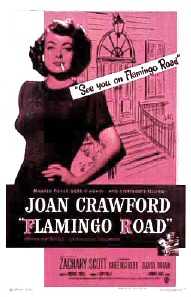Flamingo Road (film)
| Flamingo Road | |
|---|---|
 Theatrical release poster | |
| Directed by | Michael Curtiz |
| Produced by | Jerry Wald |
| Screenplay by | Robert Wilder |
| Based on |
the play Flamingo Road by Sally Wilder Robert Wilder |
| Starring |
Joan Crawford Zachary Scott Sydney Greenstreet David Brian |
| Music by | Max Steiner |
| Cinematography | Ted D. McCord |
| Editing by | Folmar Blangsted |
| Studio | Michael Curtiz Productions |
| Distributed by | Warner Bros. |
| Release dates |
|
| Running time | 94 minutes |
| Country | United States |
| Language | English |
Flamingo Road is a 1949 film noir directed by Michael Curtiz and starring Joan Crawford, Zachary Scott, Sydney Greenstreet and David Brian. The screenplay by Robert Wilder was based on a 1946 play written by Wilder and his wife, Sally, which was based on Robert Wilder's 1942 novel of the same name.[1]
The plot follows an ex-carnival dancer who marries a local businessman to seek revenge on a corrupt political boss who had her railroaded her into prison.
Plot
Lane Bellamy (Joan Crawford) is a carnival dancer stranded in the small town of Boldon City in the Southern United States. She becomes romantically involved with Fielding Carlisle (Zachary Scott), a deputy sheriff whose career is controlled by Sheriff Titus Semple (Sydney Greenstreet), a corrupt political boss who runs the town. Semple dislikes Bellamy and mounts a campaign against her. She has difficulty finding work and is arrested on a trumped-up morality charge. Meanwhile, Carlisle is the political machine's choice for senator, and to portray the perfect political family, he married his long-time girlfriend, Annabelle Weldon (Virginia Huston).
Sad that the love of her life has divorced himself from her, Bellamy finds work as a hostess at a roadhouse run by Lute Mae Sanders (Gladys George). There, she meets Dan Reynolds (David Brian), a businessman who supports the corrupt Semple so long as it is profitable. She charms Reynolds into marrying her and the couple moves to the town's best neighborhood, Flamingo Road.
As a kingmaker in the state, Semple decides to run Carlisle for governor and unseat the incumbent. Carlisle marries This is too much even for Reynolds and now he decides to oppose Semple. When Carlisle, who has a weakness for drink, also begins to show his limits in cooperating with Semple, Semple flies into a rage and abandons him, destroying Carlisle's career. Then Semple makes himself the candidate. At this, Reynolds grows stronger in his opposition. So Semple arranges to have Reynolds framed.
Later a drunken Carlisle, who knows what's happening but feels the situation is hopeless, visits the mansion on Flamingo Road and commits suicide practically in front of Bellamy. This gives Semple another weapon in his bid to ruin Bellamy and husband, who has now been indicted for graft. Bellamy confronts Semple with a gun and demands he phone the attorney general and confess everything, but a physical struggle ensues and she shoots him dead. At the end, Bellamy is in prison awaiting a ruling and Reynolds indicates he will stick by her.
Cast
|
|
Reception
Howard Barnes wrote in the New York Herald Tribune, "Joan Crawford acquits herself ably in an utterly nonsensical and undefined part...It's no fault of hers she cannot handle the complicated romances and double crosses in which she is involved."[2]
Film critic Dennis Schwartz gave the film a mixed review, writing, "Joan Crawford's follow-up to the acclaimed Mildred Pierce, where she won the Best Actress Oscar, is a cynical political melodrama that never lives up to its potential to dig deeper into political corruption but is nevertheless well acted by the talented all-star cast and is helmed in a satisfactory perverse soap opera way by Michael Curtiz (Casablanca) ... Flamingo Road is pictured as a street of success that is found in every small town across America, and there's also the wrong side of the tracks such as River Street where the losers live. The film makes the absurd assumption that everyone wants to live on Flamingo Street, and if given the chance will try almost anything to get there."[3]
Adaptation
The film was adapted into a 1980s American television series, Flamingo Road. Though the TV show took some liberties with the plot, it treated the subject matter more frankly than Hollywood had been able to do in the 1940s, and in that respect was actually more similar to the original play and novel.
Home media
The film was released on VHS by Warner Home Video in 1998, which also issued it on DVD in 2008 as part of "The Joan Crawford Collection: Volume 2".
References
- ↑ Flamingo Road at the American Film Institute Catalog.
- ↑ Quirk, Lawrence J.. The Films of Joan Crawford. The Citadel Press, 1968.
- ↑ Schwartz, Dennis. Ozus' World Movie Reviews, film review, November 7, 2004. Access: July 12, 2013.
External links
- Flamingo Road at the American Film Institute Catalog
- Flamingo Road at the Internet Movie Database
- Flamingo Road at allmovie
- Flamingo Road at the TCM Movie Database
- Flamingo Road informational site and DVD review at DVD Beaver (includes images)